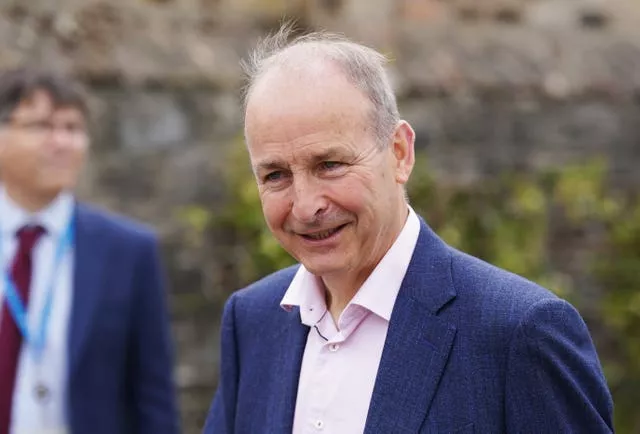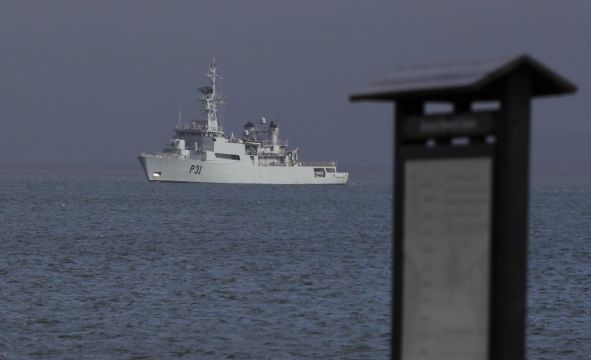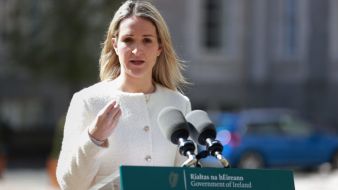Tánaiste and Minister for Defence Micheál Martin has said any cooperation with other countries on defending subsea cables will be more about technology rather than having ships in Irish waters.
His comments come after Taoiseach Leo Varadkar said it would “make sense” to cooperate with allies, the EU and Nato to secure such infrastructure.
Speaking to reporters at the Bord Bia Bloom festival in Dublin, Mr Martin said: “I think we need to understand the issue maybe a bit more.
“It’s not about having ships hovering over cables. That’s not how you deal with threat to undersea cables.”
He said because it is estimated that 97 per cent of all internet traffic goes through undersea cables, all countries are looking at how to safeguard that infrastructure.
“It’s not actually just about having physical assets or ships present over very long cables. It’s about technology.”
He said the cooperation would be similar to when countries pool resources, expertise and experience when an ally is faced with a cyberattack.
“So all of these challenges, no one country on their own are going to be able to have all the knowledge to deal with them.”
He said the complex nature of protecting cables is why there was a need to cooperate with other countries in Europe.
“That is why we are looking at in terms of our ongoing discussions with, as partners for peace, with Nato, we’re looking at a group that’s been formed some non-Nato members, some Nato, some private civilian, some state, whereby we look at this whole area of subsea cables, analyse the threats, challenges and then how best can we cooperate with others to protect those subsea cables.

“So it’s really about learning and sharing. We’ve been doing this for over 20 years.
“But the two big areas that have been identified in more recent times, obviously are cybersecurity and threat to undersea cables, other areas are hybrid warfare, disinformation, manipulation.”
Asked at the same event if the discussion on Ireland’s neutrality was over if it was asking for assistance for matters in its own waters, Mr Varadkar said: “No, I don’t believe so.”
He said the Tánaiste’s upcoming forum on foreign and defence policy would include consultation with experts and the public.
“To me, neutrality in Ireland is military neutrality.
“It means that we don’t join a military alliance, that we don’t have a mutual defence clause with any other country and I don’t see that changing.
“But it doesn’t mean that we cut ourselves off from the rest of the world.”
Mr Varadkar said Ireland has never been politically neutral.
“You know, politically, we’re supporting Ukraine and it’s fight for independence.
“We fought, we supported people in their fight against communism and independence across the world.
“When it came to the fight against communism, we all rejoiced when the Berlin Wall fell and the people of Central Eastern Europe got to become democracies.
“So I don’t think we’ve ever been politically neutral, we are a militarily neutral but that didn’t stop us joining Nato’s Partnership for Peace 20 or 30 years ago, didn’t stop us becoming part of the European common security defence policy Pesco a few years ago, so often comes down to how you define neutrality.”
He said no decision had been made on Ireland’s participation in an EU or Nato initiative to protect undersea cables.
However, he said Ireland already had military cooperation of different types including being part of an EU battle group.
“What matters is the detail and the objective of government is to make sure that our country is safe, and that we’re able to defend ourselves against any attack that might arise and it’s unlikely to be a military attack.
“In the modern world, what we could face is what they describe as hybrid security threats, for example, cyberattacks, international terrorism, industrial espionage, attacks on infrastructure around our seas.”
“A country of five million people, no matter how much we spend on defence, can never do that on our own.
“So we do need to cooperate with friends and cooperate with allies. But I don’t think that’s something new.
“It’s just something that’s evolving and developing.”







